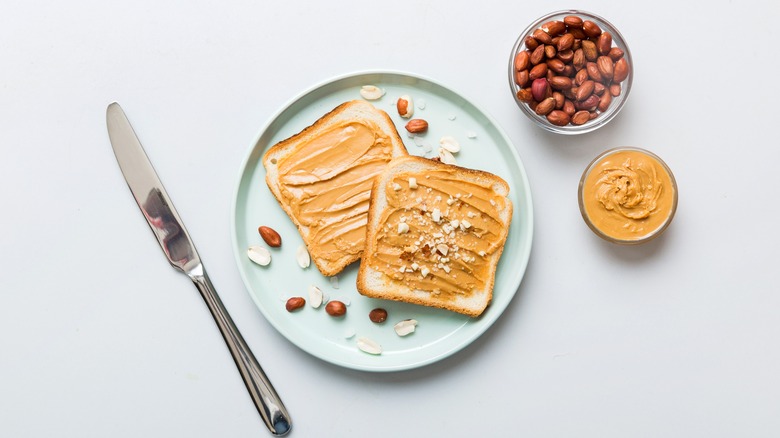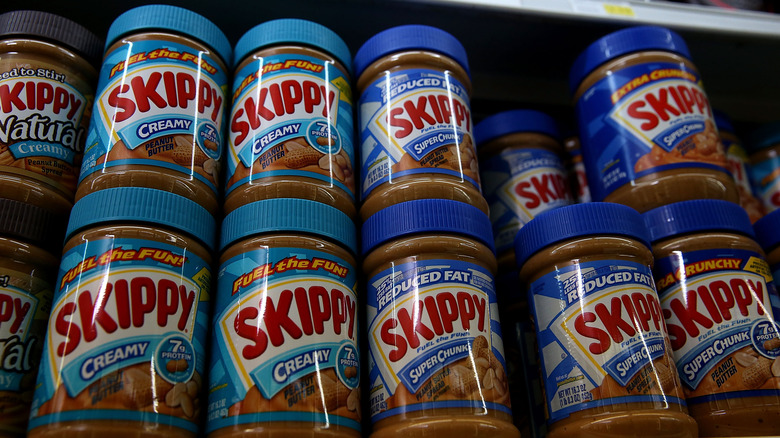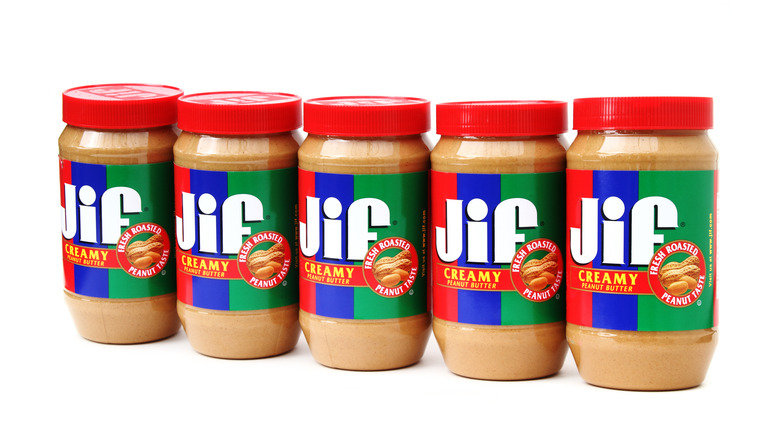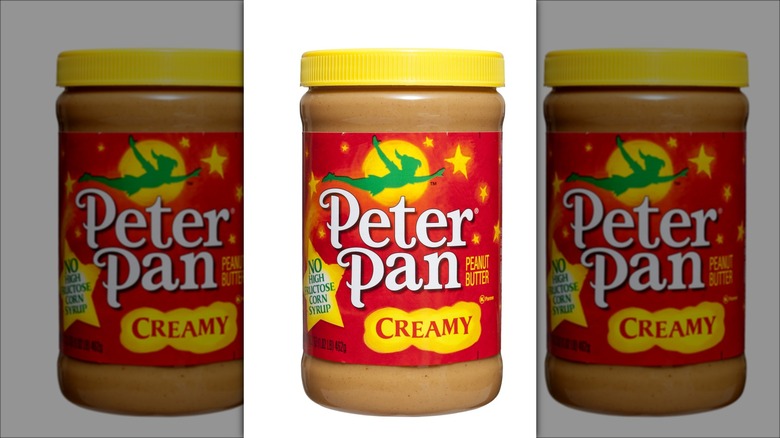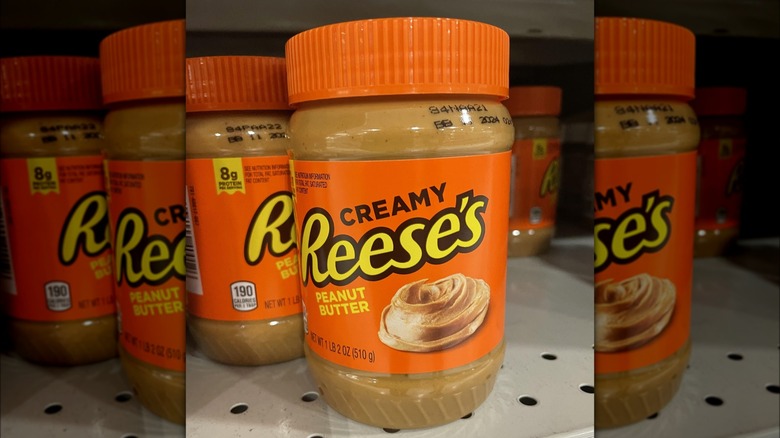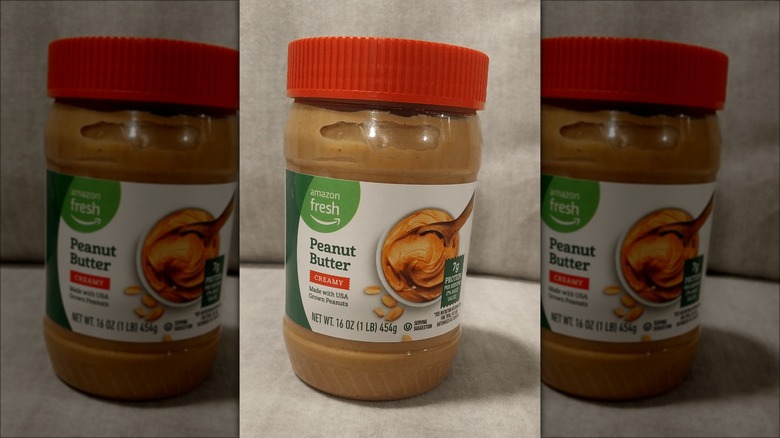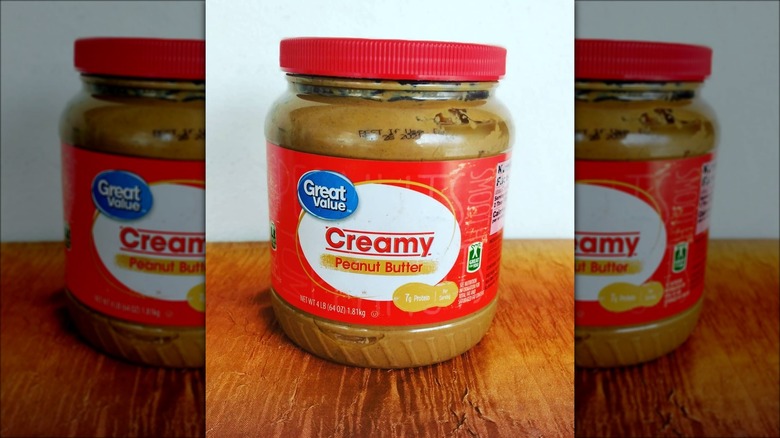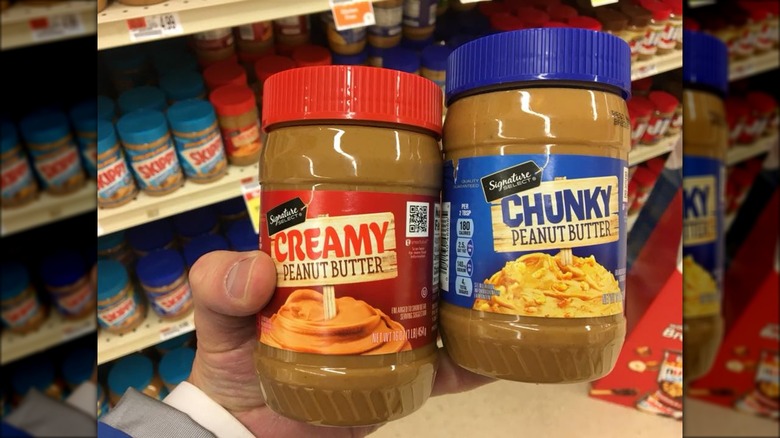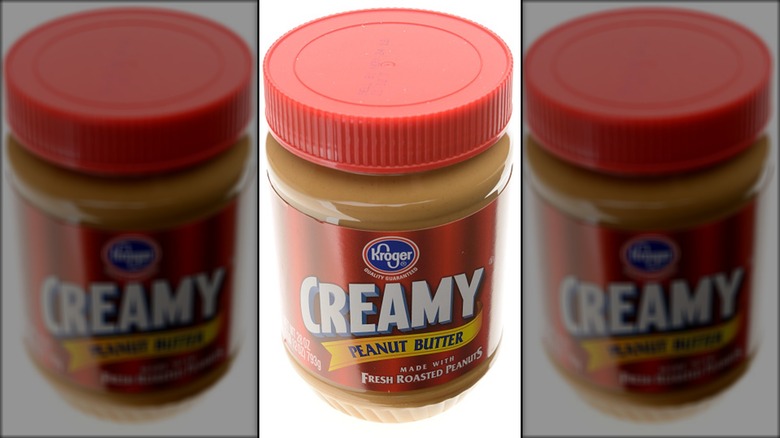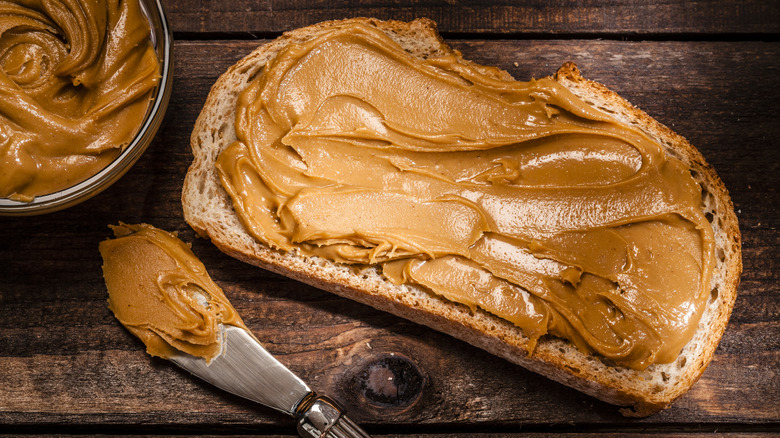8 Lowest Quality Peanut Butter Brands
We may receive a commission on purchases made from links.
Whether it's smeared on toast at lunchtime, blended into a smoothie for breakfast, or eaten straight from the jar with a spoon as a late-night snack, good peanut butter has a way of elevating every meal. But not all peanut butter is made equal. While all you technically need to make it is peanuts — and maybe a dash of salt — plenty of jars on grocery store shelves are stuffed with additives, emulsifiers, and extra sugars that drag down what should just be a protein-packed snack.
Historically, this issue has become so prevalent that it's sparked high-profile spats over what technically constitutes peanut butter. In 1959, the United States Food and Drug Administration (FDA) took up the cause and announced that every jar needed to contain at least 95% peanuts if it wanted to be sold under this name. What followed was a 12-year legal battle between the FDA and peanut butter manufacturers, which eventually ended when both sides reached the agreement that peanut butter needed to be at least 90% peanuts, lest it be given the reduced title of peanut spread.
That requirement is still legally mandated in the U.S. today. However, even if a given jar of peanut butter is 90% peanuts, that still doesn't mean it's high quality. Here are eight of the lowest-quality peanut butter brands on the market right now.
1. Skippy
We have to give Skippy credit where it's due. The brand's founder, Joseph Rosefield, changed the peanut butter game forever in 1933 when he came up with a way to produce peanut butter that was less sticky and longer-lasting. Fast forward several decades and lunchbox staple Skippy is still one of the bigwigs of the industry, with each jar of its hero product — Skippy's Creamy Peanut Butter – promising to "fuel the fun!"
While we can't comment on a spoonful's ability to control the destiny of your day, we will say that it once placed third in our ranking of the tastiest peanut butters and is arguably unbeatable when it comes to a smooth, creamy texture. Unfortunately, we can't sing the same praises for its ingredients. Skippy uses the usual culprits in its Creamy Variety: sugar and hydrogenated cottonseed, soybean, and rapeseed oils.
Worse is Skippy's Reduced Fat Peanut Butter Spread, which throws in corn syrup solids and mono and diglycerides, and ups the sodium content to a whopping 170 milligrams per serving — the most of any brand on this list — and loses the right to be called an actual peanut butter, all for the sake of lowering the fat content by 25%. This is the case with most reduced-fat peanut butters; despite being marketed as the "healthier" option, you're more likely to be better off ditching the added sugars and embracing the healthy fats naturally provided by peanuts, as long as you do so in moderation.
2. Jif
Jif may well be America's favorite peanut butter brand, responsible for over 30% of all jars sold in the U.S. The red cap is a familiar fixture for a good reason — it's smooth, creamy, just the right amount of sweet and salty, and actually came out on top of our ranking of the tastiest peanut butters on the market.
Sadly, if you put down the spoon and check out the label, things are a little less positive. The second ingredient listed on a jar of Jif's Creamy Peanut Butter is sugar, while the rest is made up of salt, mono and diglycerides, and fully hydrogenated vegetable oils, which drag down the butter's overall quality. While the oils help the peanut butter itself — extending its lifespan and stopping it from separating – they're not as kind to our bodies and have been linked to negative impacts on cholesterol and heart health.
Some varieties of Jif are healthier than others. Despite the brand heavily promoting the lower sugar and sodium content in Simply Jif Peanut Butter, it still contains the same oils and emulsifiers. Again, arguably the worst of the bunch is the Reduced Fat Peanut Butter, which contains 60% peanuts — technically making it a peanut butter spread, not an actual peanut butter. Even Jif Natural, which may sound deceptively high-quality, still contains sugar and molasses (but does at least manage to scrap the hydrogenated oils).
3. Peter Pan
Nothing screams childhood quite like making a PB&J with peanut butter scooped out of a jar that is emblazoned with the boy who wouldn't grow up. Peter Pan has been around since 1928 and was actually the first branded peanut butter in the U.S., making it one of the granddaddies of the business.
Taste-wise, this brand knows exactly what it's doing, but its products typically use some not-so-magical ingredients to take your tastebuds to Neverland. Instead of relying on straight-up peanuts, the Peter Pan Creamy Original Peanut Butter contains roasted peanuts, sugar, and 2% or less of hydrogenated rapeseed and cottonseed oils. To put these ingredients into context, they stack up to 16 grams of fat per two tablespoons — 3 grams more than two Reese's Peanut Butter Cups (which says a lot, because they're the antithesis of a quality peanut butter snack).
Yes, we need to consume fat to survive, and, yes, peanuts are packed with healthy fats. However, the big issue here is that the concentration of saturated fat is particularly high, with each serving giving you 18% of the amount experts recommend you consume per day.
4. Reese's
If Reese's peanut butter tasted half as good as actual Reese's Peanut Butter Cups, we'd be willing to cut it some slack. The reality is that despite Hershey's marketing it as a packaged version of the inside of its famous candy, this peanut butter tastes distinctly different — meaning it's not only bad quality but just generally bad.
The briefest look at the ingredients list tells you everything you need to know about the quality of this product. Reese's Creamy Peanut Butter contains peanuts, sugar, a blend of three hydrogenated oils (rapeseed, cottonseed, and soybean), salt, peanut oil, monoglycerides, molasses, and cornstarch (and breathe). It's a hefty list ridden with additives that have no place in a cupboard staple like peanut butter, and give each serving 13% of your daily recommended saturated fat intake.
If you're going to indulge in a Reese's product, we recommend just tearing into a packet of Peanut Butter Cups themselves. They may not exactly be of higher quality, but they will at least bring you and your tastebuds far more joy. Then, find a jar with a more concise ingredients list for your other peanut butter needs.
5. Amazon Fresh
The constantly out of stock Amazon Fresh isn't quite the hit the online retailer clearly hoped it would be when the brand launched in 2007. Today, several of its physical stores have been shuttered, while Amazon has ditched its Just Walk Out technology which previously allowed customers to grab products and leave the store without stopping to physically pay. We wouldn't blame the food, though. Several of its products appear to have become cult favorites, with its peanut butter racking up over 12,000 five-star reviews.
Tasty though it may be, the ingredients list for Amazon Fresh Peanut Butter (which was previously sold under the brand name Happy Belly) is the same as most other medium- to low-quality peanut butter brands. Each jar contains dry roasted peanuts, sugar, salt, and — of course — hydrogenated vegetable oils. Specifically, rapeseed, cottonseed, and soybean. To limit the increased saturated fat intake that comes with these oils, we recommend checking out Amazon's other house-brand peanut butters, which are distributed under its 365 by Whole Foods Market banner and which contain just one ingredient: good ol' peanuts.
6. Great Value
Walmart's house-brand range is perfect for anyone looking to stock up their pantry on a budget. Plenty of Great Value products are worth trying, as they can match — and sometimes even outdo — the brand-name competitors. Sadly, we can't say the same about its peanut butter. If you're looking to infuse your PB&J with quality ingredients, you may want to look beyond Great Value, which has already garnered poor reviews from regretful customers.
Great Value Creamy Peanut Butter mixes peanuts and salt with the usual combo of hydrogenated oils (rapeseed and cottonseed), sugar, and molasses. Meanwhile, the Crunchy variety adds emulsifiers into the mix, too — something that nutritionists are increasingly concerned plays a negative role in our gut microbiome. Not only do these ingredients make each jar unnecessarily high in fat and sodium, but they don't even translate to a tasty spread. Reviewers have condemned its lack of a robust peanut flavor and a strangely burnt aftertaste, accusing it of tasting more like oil than anything else.
The majority of Great Value's peanut butters are of a similar quality. There's just one exception: Great Value Organic Creamy Stir Peanut Butter, which has a refreshingly short ingredients list made up of just organic dry roasted peanuts and sea salts. In turn, its sugar content is low (it contains just 1 gram per serving) and it contains 45 milligrams less sodium than the Creamy variety. Now, that's what we might call "great."
7. Signature Select
Safeway's house-brand peanut butters come in several different varieties, with the most popular being the typical Creamy and Chunky options. Regardless of which you choose, both water down their peanut levels by adding in the go-to ingredients of sugar, molasses, and hydrogenated rapeseed, cottonseed, and soybean oils. These in turn notch up the saturated fat content to 3 grams, which makes up a significant 15% of your daily recommended allowance.
A third version of the peanut butter — the Signature Select Peanut Butter No Stir Creamy — may not be the straight-up mix of peanuts we hopet o see, but it does at least cut out the molasses and fully hydrogenated vegetable oils. However, that doesn't necessarily make it better quality. Instead, the brand substitutes palm oil, which still has low nutritional value, is high in saturated fat, and increases in sodium content to 140 milligrams per serving. Plus, the oftentimes untold truth of palm oil is that it's linked to serious environmental impacts like deforestation. Reviews from those who've given it a try also suggest that it isn't as "no-stir" as it claims to be, making it a disappointment on all fronts.
8. Kroger
Who could have guessed that the largest supermarket in the U.S. also has its own brand of peanut butter that taints the natural goodness of roasted peanuts? Kroger Creamy Peanut Butter contains — that's right – hydrogenated vegetable oils of the rapeseed, cottonseed, and soybean variety, which contributes to its high concentration of saturated fat (two tablespoons contain 13% of your recommended daily intake, to be precise). Both Kroger Creamy Peanut Butter and Kroger Crunchy Peanut Butter also boast sodium levels that are higher than many of its competitors, at 150 milligrams.
The exception for low-quality peanut butter at Kroger is its Natural Creamy Peanut Butter. Like most natural varieties of peanut butter, it forgoes the fully hydrogenated vegetable oils and instead sticks to two simple ingredients: peanuts and salt. This slashes the amount of saturated fat, sodium, and sugar in each tablespoon and also boosts the amount of good stuff — like iron, calcium, and potassium — in each serving.
Methodology
Even the tastiest peanut butter can be low quality. The reality is that a lot of our favorite brands pad out the quality ingredients (by which we mean peanuts) with sugar and oils to make peanut butter cheaper or easier to produce. We used the number of ingredients as our starting point to find the worst quality peanut butter brands. We weren't necessarily looking for peanut butters high in calories or fat, as both of these things are inevitable with even the purest peanut butter. Instead, we examined the ratio of overall fat content to saturated fat, the amount of added sugars, and the inclusion of hydrogenated oils, all of which have been linked to negative health effects.
Not every product offered by a brand contains low-quality ingredients. We included the brands that use low-quality ingredients in the vast majority of their products but have also mentioned when a brand offers a high quality — or just better quality — peanut butter as a part of its product range.
